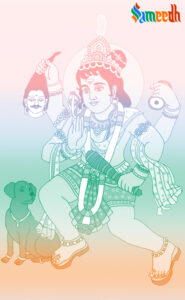Batuk Bhairav, also known simply as Batuk, is a form of Bhairav, who is considered an aspect of Lord Shiv in Hinduism. Batuk Bhairav is often worshipped for protection, prosperity, and the removal of obstacles. The word “Batuk” means “boy” or “child” in Sanskrit, and this form of Bhairav is often depicted as a young boy.

Batuk Bhairav is indeed a specific form of Bhairav, an aspect of Lord Shiv in Hinduism. Bhairav is often associated with fierce and terrifying aspects of Shiv, and Batuk Bhairav is a unique manifestation within this broader category. In some traditions, Batuk Bhairav is worshipped as a child form of Bhairav. This form represents the innocent and playful aspect of the deity. Here are some key features associated with Batuk Bhairav:
- Appearance: Batuk Bhairav is typically depicted as a young and playful child, with a blue throat (Neelkanth), symbolizing the consumption of the poison during the churning of the ocean (Samudra Manthan) as described in Hindu mythology.
- Attributes: He may be portrayed holding a trident (trishul) or a drum (damaru) in his hands, and he may have a dog as his vehicle.
- Worship: Devotees often worship Batuk Bhairav to seek protection from enemies, removal of black magic, and for general well-being. The worship of Batuk Bhairav is particularly prevalent in certain Tantric traditions within Hinduism.
- Temples: There are temples dedicated to Batuk Bhairav in various parts of India, and special rituals and ceremonies are performed by devotees to gain his favor.
The worship of Batuk Bhairav is often associated with Tantric practices, and it may involve rituals that are not commonly found in mainstream Hindu worship. Tantric traditions emphasize the use of specific mantras, yantras (sacred geometric diagrams), and rituals for spiritual growth and empowerment.
Devotees seeking blessings for courage, protection, and spiritual progress often turn to Batuk Bhairav in their worship. Temples dedicated to Batuk Bhairav can be found in different parts of India, and special festivals or rituals are observed in honor of this deity.